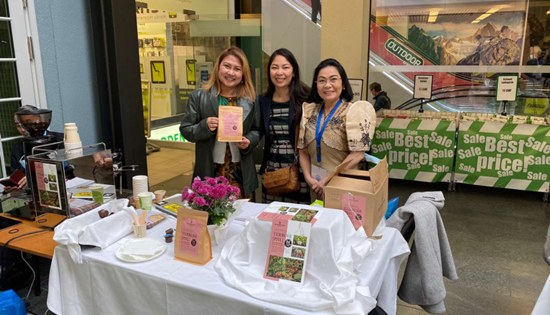Kapeng Barako
conquers Switzerland

DTI
Switzerland Commercial Counsellor Magnolia Ashley (center) with
booth visitors. |
By
DTI-Foreign Trade
Service Corps
November 5, 2021
MAKATI CITY –
Blaser Café, one of oldest coffee traders (since 1922) and
well-established coffee roaster in Switzerland, added Philippine
Liberica coffee beans aka “Kapeng Barako” in their Terroir line.
The term "terroir", which
originally comes from viticulture, is now also used in the coffee
industry. A significant part of the character of a coffee can be
traced back to its origin. It is the terroir that gives coffee its
complexity. The soil and the climatic conditions shape its aroma,
its acids and thus the entire profile of a coffee.
The Terroir line from
Blasercafé in Bern responds to this awareness that the cherries of a
coffee plant cannot thrive in exactly the same way in another
location. On the package, the GPS coordinates of the respective
plantation indicate where the beans come from, and thus their origin
is 100 percent traceable.
In the case of kapeng
barako, the Philippine Liberica beans, is traced back to the town/
municipality of Alfonso, Cavite. The ground on which the trees in
Alfonso grow is enriched volcanic soil from the nearby Taal volcano.
Fortunately, Alfonso was spared from the effects of the volcanic
eruption in January 2020.
The Terroir line is
roasted on a Ghibli profile roaster from Coffeetech located in the
Rösterei Kaffee in Bern, Switzerland. This allows small batches of
coffee beans to be roasted to profile. The roasting time and the
roasting curve (temperature curve) can be defined according to the
origin and variation of the beans by a computer software. In the
case of Liberica beans, it was roasted in medium temperature that
results to sweet, creamy, and juicy mouthfeel with rum, dried
fruits, and brown sugar notes. Kapeng Barako is recommended to be
served as espresso or black and prepared using Bialetti-Kocher,
espresso machine, or fully automatic coffee machine.
Every cup of Philippine
Liberica coffee helps support small coffee farmers, particularly in
the provinces of Batangas and Cavite where the majority of this
coffee is grown. The Philippine – EFTA Free Trade Agreement enables
duty free importation of coffee beans to Switzerland.
A soft launch was held on
22 October together with Swiss media and free tasting during the
2021 Fernweh Festival. Blaser Café’s Terroir PHL will be available
throughout Switzerland starting December. Mainstreaming of
Philippine coffee in Switzerland was a joint effort of Le Café
Filipina, Blaser Café Suisse, and the Philippine Embassy in Bern -
Department of Trade and Industry.